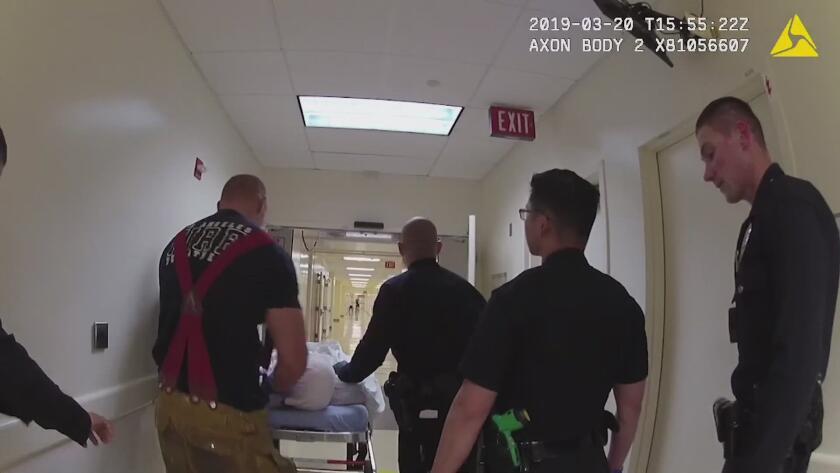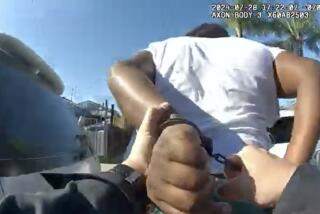LAPD will refer incident in which firefighter punched restrained detainee to D.A.
The footage shows a city firefighter repeatedly punching a restrained detainee on a hospital gurney.
The Los Angeles Police Department will refer to prosecutors for possible criminal charges a 2019 incident in which an L.A. firefighter punched a restrained detainee in the head, police officials said Friday.
The announcement, released alongside previously unpublished body-camera footage of the incident, marks an abrupt shift in a case that had lingered unresolved for 18 months until The Times received a tip about it in August and published two articles detailing what occurred.
Firefighter Derek Farrow, who had previously rejected internal punishment in the matter in favor of going before a disciplinary panel, instead accepted a 12-day suspension from the Fire Department late last month — one day after The Times’ first article was published, internal records show.
He declined to comment Friday through a union representative. Domingo Albarran Jr. said Farrow wants to put the incident behind him and didn’t feel he would receive a fair hearing given the current atmosphere — in which protesters across the country have called for greater accountability from police and other public safety officials.
Police announced the referral of the case and posted the body-camera footage online Friday, three weeks after it was requested by The Times. The LAPD hasn’t provided The Times with the full-length, raw video from the body-worn camera despite several requests.
The footage, recorded by an unidentified LAPD sergeant, shows Farrow twice punch the detainee, Earl Hatton, while Hatton is strapped to a hospital gurney in a hallway of L.A. County-USC Medical Center in March 2019. The video also shows Farrow holding a towel around Hatton’s face.
The Times had previously obtained hospital surveillance footage showing Farrow tighten the towel around Hatton’s face and use it to yank the man’s head down on the gurney. Internal records obtained by The Times said the use of the towel by Farrow, who is white, had prompted Hatton, who is Black, to yell, “I can’t breathe!”
Farrow, working as an emergency medical technician at the time, has alleged Hatton was spitting at first responders and medical staff, saying he wanted to give them communicable diseases he had, and had bitten a LAPD officer. Farrow said he used the towel to stop the spitting and struck Hatton to stop him from biting the officer.
Farrow continued to work in the city after the incident as he awaited his disciplinary hearing. The Los Angeles Fire Department has repeatedly declined to explain why its investigation of the incident — which was reported the same day it occurred — took so long.
LAPD spokesman Josh Rubenstein said Friday that detectives planned to refer the case to prosecutors in L.A. County Dist. Atty. Jackie Lacey’s office but had not actually done so as of Friday afternoon because they were still working on the case.
Lacey’s office did not respond to a request for comment.
Albarran said the LAPD’s suggestion that the incident will be presented to prosecutors was misleading. He said neither he nor Farrow had been notified of any referral. He also said the incident had previously been referred to Lacey’s office and rejected for criminal prosecution.
“The D.A. looked at it and said, ‘There’s nothing here,’” Albarran said.
He also said additional LAPD footage of the incident had not been posted by the LAPD on Friday, including footage that shows the officer who was bitten address the bite and pull up his sleeve to check for a puncture wound.
Footage also exists of Hatton spitting and shouting racist insults at the first responders around him, Albarran said.
In the commentary released along with video Friday, Police Capt. Stacy Spell said that the footage would not normally be released because it “does not meet the criteria of the department’s policy regarding the release of video evidence” but that LAPD Chief Michel Moore “made the determination that, because of media inquiries and community concerns, it’s in the best interest of the public to release this video.”
Spell also described the events that led up to Hatton’s arrest, including that he had assaulted a woman with a brick, then injured his own head after being arrested by banging it in the back of a police vehicle. Hatton was convicted in the preceding incident and sentenced to four years in prison.
Rubenstein said LAPD officers turn off their body cameras in the hospital. However, after Farrow punched Hatton, the sergeant activated his camera.
LAPD body cameras continually record a two-minute loop of footage, even when they are not activated. When activated, the cameras retain the previous two minutes. In this case, it was during that retained portion of footage that Farrow punched Hatton.
Both Farrow’s use of the towel and his punching of Hatton were determined by Fire Department investigators to be against policy, according to records. Fire leaders also flagged the incident to county health officials, who control city EMTs’ licenses, as a possible breach of state law barring the abuse of patients.
County officials concluded that the Fire Department’s own discipline for Farrow was sufficient and that they would not seek to revoke his license.
Hatton, 24, remains incarcerated and couldn’t immediately be reached for comment. But his sister Marchaunte Fisher, who lives in Sacramento and regularly speaks with her brother, said she was “mortified” seeing Farrow strike him in the video.
“What gave him the right to think he could do that?” Fisher said. “He has the towel tightly wound around his head…. There wasn’t a need for that.”
Fisher said the video release left her with more questions for the Police Department.
“They say he hit his head in the car, but where is the evidence of that?” Fisher said, adding that she wants to see the department release the body-camera footage of her brother’s arrest as well.
Fire Commissioner Jimmie Woods-Gray viewed the video and said she couldn’t see the struggle described in the reports. “I just need to have the department meet with the commission in closed session and explain what’s going on,” she said. “We’re not getting any answers.”
More to Read
Sign up for Essential California
The most important California stories and recommendations in your inbox every morning.
You may occasionally receive promotional content from the Los Angeles Times.













